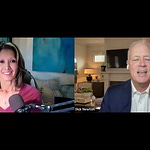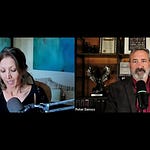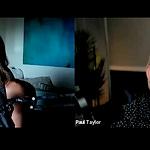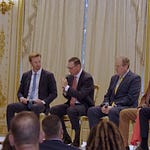Few people have distilled down what is happening across our culture: from DEI to gender ideology to queer theory to postmodernism. They may seem unrelated, but they share DNA as off-shoot ideologies under a Marxist umbrella or genus. To think of Marxism as simply an economic theory would cloud your ability to see this connection. To grasp Marxism, you have to understand that it is a way of defining what it means to be human: answering the questions around the ontology and telos of man.
James Lindsay - author, mathematician, philosopher, founder of New Discoursesblog/podcast and social media provocateur - has dedicated this season of his life in unpacking Woke Marxism. He joined me for a two-hour interview to talk about why Marxism isn’t just a theory but rather a religion — a gnostic perversion of Christianity that is in the lineage of the serpent in the Garden of Eden.
This interview could have gone on for a couple more hours as Lindsay is a wealth of knowledge. We barely touched on Maoism, Fascism, etc.
But in this interview we do cover a lot of ground, including Lindsay’s through-line moment, a time in which a person makes the connection between an axiom they hold dear and a political agenda. For Lindsay, it was several key moments, including times when science was made a mockery in the name of the feminist political movement.
Highlights in transcript form [edited for clarity]
1:30 - Lindsay outlines how Marx’s economic theory is more of a belief system and worldview that asks “What does it mean to be human?” For his 30-minute version, see his talk at the EU Parliament.
Lindsay: Marxism has been incorrectly thought of as primarily an economic theory. But it is a conception of the world; a belief system; a worldview. Marx is really asking the question: What does it mean to be human? He starts by negating religion, calling it a false narrative. To him, true criticism starts with the criticism of religion. He declared himself an atheist. But he is asking himself: what does it mean to be human?He writes about the distinction between animals and humans. He says that human beings are intrinsically creative and social. They are essential human characteristics that elevate us above animals.
3:30 - Marx’s answer: Intrinsically creative and social
Lindsay: Marx answers the question what does it mean to be creative this way: You can envision in your mind the vision of the world and you can create it. Let’s say you want to make a picnic table. You draw it out and then you build it. This is being engaged in an act of poetic creation [poiesis]. We are also continually creating society in ourselves. This is called practical creation or praxis; your actions and involvement in society is creating the people in society. Human beings who do the labor for others don’t realize they’re creators because of the division of labor that has alienated them from who they are as creators. The laborer gets dehumanized. So what does it mean to be a person?It means being a creative being.
Lindsay: He also says we're social beings. We work and live for one another and we need to continually work to create ourselves. The capitalists envision society for everyone to do the work and thus they can be miniature gods. So they alienate people from their true nature. That’s why Marx says we have to destroy this whole architecture. Marx also ask the question: what is it that allows man to create man? His answer in the mid-1800s was that economic conditions create man. But what he’s really laying out is a religious architecture. When Marx says we are going to seize the means of production, it’s not just seizing the means of material production but seizing the entire economic system. This is a perfect vision that requires liberation from the constraints of bosses. Marx wants the people to make man into this being.
7:50 - Lindsay gives a brief summary of his biological taxonomic ranking of Marxist theory and its off-shoots.
Lindsay: Now stepping back, you don’t have to say that it’s solely economic conditions that make man. Read the Communist Manifesto, the first paragraph he explicitly defines the way to view the world through an “oppressor and oppressed” matrix. And this works across any axis of oppression. Marx is a genus of socio-political theories or worldviews. If you think of economic conditions, you get a particular species. If we choose a different axis of oppression, if we say racial oppression then race defines this species and it is race that is the determinant or the dividing line or stratification. So CRT is just Marxism reconstituted with race in place of class. If you look at normal, you get Queer theory; if you look at gender; you get Feminism; If it’s knowledge; it’s critical pedagogy. If we refer to people interpreting the meaning of symbols, then you get postmodernism. This is the constellation of identity or philosophies. And with woke - it synthesizes them into one theory under Marxism. When Marxism is his interpretation of what it means to be human and what conditions make man human. We can then see the entire list of woke theories are derivatives of Marxism. The claim I made at the EU parliament is that Marxism - the genus - had to evolve to fit into different cultural conditions. The economic case worked well with Mao and for the Bolsheviks. But not elsewhere. It’s like a virus. It evolves to attach to a receptor. Western society had receptors in race, sexism.
13:30 - Lindsay offers ways to persuade people on the Left that looking at life through a power dynamic (oppressor/oppressed) that relies on one variable as its key determinant ignores many other factors that contribute to that power dynamic.
Lindsay: These worldviews are extremely hermetically sealed. It’s difficult for them to see outside of them. In Mao’s China, they called it the People and the Enemies of the People. Once you’ve adopted the People’s standpoint, you’re in a bubble and it’s difficult to see outside of it. They have to see some irreconcilable contradiction, like the sexual books in front of children which is causing many parents to ask questions. You have to be able to receive this person. They have to see a crack in the worldview. Maybe you can introduce that crack, but it will be hit or miss. I can tell you when I was redpilled about Trump and pulled out of Trump Derangement Syndrome. You have to be a landing page. That’s what the Christian church has always organized to be. When someone sees through and you ask them a question, they feel “safe” to ask you and have the capacity to make sense for them. This is very passive. If you want to be proactive, the rule of thumb is never give information they didn’t ask for. Instead, ask them questions. Let them explain. You can ask: What’s the value of a drag queen? You have to lead them to a moment of curiosity. Ultimately, we’re dealing with cult deprogramming. You have to be patient; ask questions; and don’t be alienating.
18:15 - Lindsay’s redpill moment explained:
Lindsay: About my Trump experience; someone asked me a question: have you seen the full clip where Trump said the very fine people thing? I watched it. And if you watched the entire clip, it turns out it contradicts the media narrative. He denounces white supremacy. This gave me a moment of questioning. Then he went the next step further. He sent me a video of Trump denouncing white supremacy 50 times. Now I’m watching Trump instead of the CNN highlights and I realized, “OMG, they do this all the time!” But conditionally, I had to be in a position where I was ready. It’s a difficult thing to do. One of the chapters in my book is let friends be wrong. The church shouldn’t be like the Westboro Baptist Church protesting funerals. That doesn’t pull people in when they’re hurting. Same thing with individuals, if you argue with your brother-in-law all the time, when he has a crack, he won’t go to you. So you have to have that open relationship.
21:35 - When was Lindsay’s through-line moment?
Lindsay: There’s not one moment I drew a throughline to a political agenda. I got sucked out of this psychological operation of Trump Derangement Syndrome and I was in that around 2015-2018, that was a political domain. But there are others. The very first time I saw something was wrong, I was in a discussion with friends: some blue collar and some academics. They got into a fight about affirmative action. The academic got incensed saying that I was racist. I intervened and said you need to listen to his story. But she said, he’s a white man and his story has been told. Then science came up. I started watching third-wave radical feminism going after everything. Another big moment was during the #shirtgate controversy with Dr. Matt Taylor, the project scientist of the famous Rosetta mission. Taylor wore a controversial shirt with bodacious women emblazoned on it while he was on national TV handling the Rosetta comet. Many people called his shirt sexist. They ruined this guy. Another moment was this paper in 2016 about Feminist glaciology. to make the whole science sexist. It got to the point that there were satellite pictures that are pornographic. It was super confusing. The paper says that it assumed objectivity and assuming a God’s eye view from nowhere. Then this feminist who paints pictures of glaciers and complains that her paintings are used in science. M Jackson, 20 minute video talking about glaciers Tedtalk. As a coldhearted physicist, then she talks about death threats. This paper is unbelievable. It’s so crazy. At that moment, that was when I realized there is an outright political attack that is going after science. When writing hoax papers, one paper was focused on education. The paper was about teaching privilege to kids of privilege. The idea was to abuse the kids, but with compassion. We were told not to offer up compassion. This was part of the pedagogy of discomfort. It was at that point, we realized the logic of pedagogy of discomfort taken to its extreme would be genocide.
I started reading Repressive Tolerance by Herbert Marcusa and realized we were living in this essay. The summary of that essay was that we should extend tolerance to all movements from the left, including violence but remove tolerance from the right.
34:45 - Gnostic heresies: If Marxism is the genus, gnosticism is the family; the serpent is the class/order.
Lindsay: There are many esoteric gnostic theories preceding Marx. The philosophers that preceded Marx, including Hegel and Rousseau, who were caught up in esoteric gnostic theories. They all rely on hidden knowledge which is gnosis. They were products of the enlightenment. They had stepped away from the spiritual realm. They recreated a new classification of gnosticism, which I call sociological gnosticism. The social realm operates as the spiritual realm. In Rousseau’s “man is born free but is everywhere in chains,” the chains for him is society: the laws, civil duties that constrain man. Society produces the demiurge, the creator of the world, not the God in the Bible. And this world is a prison, the prison of our spirit. When the serpent comes and says “God hath not said…” He creates the full world and kicks man out of Eden and the world will really work like a prison. The idea is to see into the falsity of the material world. The secret gnosis will set you free from the incarceration of the world. Your body becomes less important. You become an “elect” - who is better because you know the true nature of reality. You are escaping the prison. With Rousseau - if we can return to this savage nature, then we can break free of the chains of society. Hegel is the same in the realm of ideas. Escape the limitations of our ideas between the society that we have vs the society that can be. Then with Marx, he’s much more gnostic. Marx believed the bourgeois imprisoned the proletariat for its benefit. He calls the bourgeoisie alien - which is the demiurge. The bourgeois class becomes the demiurge of a sociological gnostic religion. The Marxist solution is that the proletariat can awaken to gnosis and in a sense take a bite from the fruit of knowledge and overthrow the conditions, then through their knowledge they can take control of society and intentionally become the next demiurge. But because they’re enlightened, they can bring men back to Eden with them as gods. For Marx, gnosis is that you’re a socialist (a species being). Socialism is a gnostic belief. Antiracism is the gnosis. He’s the gnostic and understand the true nature of racism. And they can discriminate along the lines of man’s true nature which is antiracist.
45:00 – It’s how the sociological program works. The evil is brought down from the oppressor class. They’re never wrong. It’s always the system’s fault. Claudine Gay didn’t intentionally plagerize, it was the system and she had to do this. This is the same with restorative justice. If you’re a member of some minority, you don’t know not to be bad and you have to do what you have to do. So we can’t punish the same way as someone in the beneficiary class. It’s a bizarre belief that there is an intrinsic goodness that they have to awaken to and that society and system is what is to blame. You see within the trans movement. They have images of trans person and it says “this is a glimpse of divinity.” They’re explicit in their thinking that they’re extremely sacred. To see a trans body is to get a glimpse of the divine. This trans was ambiguous and it was a seraphim level of Saint Michael. Transcending your physical form raises you to a status of divinity. This is a reconstruction of gnostic belief systems in sociological systems.
48:45 - Lindsay’s journey from Democratic atheist to independent agnostic
Lindsay: Why I regretted New Atheists - it’s a critical movement. It’s critical religion theory. I was raised Catholic. Catholic church isn’t inspiring for children. There wasn’t a lot of children’s church. It was boring. Stories were quite implausible. Functionality, it also had a lot to do with friends that I didn’t have. I didn’t have a social connection. It was alienating. Led me to question whether this was real. So Baptists weren’t nice. I felt, I was kept silent. I resonate when people say “in the closet” - living in the Southeast in the 80’s and 90’s not buying the whole bible story.
51: 45 - The New Atheist movement was a rag tag coalition of people aggrieved. Angry feminists mad at the patriarchy; Homosexuals mad about conservative Christians. It was mostly a ragtag group that wanted to throw rocks at the cathedral. That energy of repression - Marxism is designed to give that a channel. New Atheist movement was primarily a critical religion movement. It was how do we criticize religion. Tear it down and deconstruct and pull apart. And this wasn’t healthy. So I grew out of this. What I saw a lot of movements inside the new atheist movements were getting more aggrieved. They were turning to social justice. They were recreating the resentment-laden direction that Marx outlined in the true criticism of the world where he says true criticism begins with the true criticism of religion… Early on, I switched from caring about stupid arguments about religion and got interested in religious psychology and why people believe. Then I was interested in cult - why were people interested in them; Then I got fascinated with conversion experiences. When people convert, they have this elation. High zeal. Why? Then I went off going after woke stuff. That’s the long and short of my involvement.
55:20 — I feel there were multiple dimensions of resentment. There are two different atheist movements - radical ones focused on identity grievances. The normal ones were scientific ones: Dawkins probably wasn’t aggrieved. He may have been frustrated trying to fight the same battles. Also he wanted to write the God Delusion many years back but his publisher kept telling him that it wasn’t time. So he was probably feeling constrained by this arbitrary power, and had some resentment. I felt constrained the cultural hegemony of Protestant Christianity in the Southeast. There’s this arbitrary repressive power generates resentment. That resentment can turn toxic.
58:00 -- Lindsay’s view on relationship between science and religion
Lindsay: There is a profound line between people who are certain we are not god or people who think we are god. That line is the most consequential. I look at the world (feminist in the 80’s called it recalcitrant nature = you can’t will something into being). I remain humble against recalcitrant nature. A god would be able to change the activity and laws of nature. There’s a lot of humility in accepting that everything is out of my control and is bigger than I. We’re tremendous alignment when it lands on humility. The other side of that divide is where we can manipulate nature to avoid constraints. Then you hear that gnostic thing come back. You hear Yuvul harrrari - humans are far enough to break free of nature itself. That’s like every Greek myth - hubris story - where someone dies. That’s the dividing line - humility vs arrogance. There are ways to align science to Judeo-Christian precepts. In John 1, “what was in the beginning and the word became flesh.” If you translate that to there is a comprehensible structure of reality. Science is built off the concept of let’s understand that reality. Then take the humility that we aren’t the arbiters of what is, that which is bigger than us, then you have the ability to reason and using logic as the foundations to discover reality. What’s going on is the relationship between reality and truth. The usual definition in scientific west accept about truth is that which corresponds faithfully to reality. What you can extract from the Judeo-Christian structure is that you have to have the humility but it also has a logical comprehensible structure that we can make sense of. The Old Testament is this story that the people did the wrong thing, then things got good; If you align yourself with humility, you will have better outcomes. The scientific enterprise that developed from a wide variety of early inputs ties back to two perspectives: 1) there’s something that is bigger than us that we have no claim on 2) this is intrinsically comprehensible. It’s logical and in order.
1:07 - Christian Nationalism - definition A) America’s laws and culture should be guided by Christian values (52% people hold this view); B) Government should be a theocracy (fringe view). How do you fight this Left playbook as they try to convince everyone that all Christians are defined by definition B?
Lindsay: It’s targeted at psychologically at 28-40 Christian men; they’re trying to pull these men into these definitions. The Left broaden and condense the conceptual range of a term at will so they can misdirect people into thinking all Christians are representative of some fringe sect. You’re asking the exact same question as How do we take LGBTQ and separate LGB from T. What the queer theorists do is do radical queer activism. And if you say you don’t like that activism, they say you’re attacking the LGBTQ community. Same thing with feminism. Someone says some extreme thing, like all men belong in a camp. And you say, you don’t like that and that’s crazy. Then feminists will say, “James say women are crazy.” This happened with President Trump. A reporter said, “You said women are pigs,” and Trump said, “No I said Rosie O’Donnell is a pig.” You have to start indicating and showing parallel examples helps people see that they’re taking a small group and making it representative of a bigger group in a bad way: “All Christians are Christian Nationalists or associated” or in a good way. It’s the same trick they use when you say “I don’t like Drag Queens” but then they say you’re attacking gay people. Showing they are manipulating the lexical range of these terms to reach maximal impact for their agenda. Until you see it, you know it’s wrong but you don’t know why or how - this is mystical. The idea is to show people examples to break out of their biases so they can see manipulation for what it is.
1:14 This is Bolshevik and perfected by Mao. Mao laid out an identity politics system. He held up everything in the name of the workers and the peasants; Peasants were the icons but also tokens (mistreated). But it was the revolutionaries that did the activism. Peasants were tokens. Mao would attack the ideological enemies but make sure the flack hit wealthy farmers and the class enemies. Class enemies and ideological enemies were not the same thing. Revolutionaries would act in the name of the tokens and attack ideological enemies and let flack hit the class enemies. And what this would cause was a misunderstanding of who’s attacking whom. And it would turn people against the peasants rather than the revolutionaries. We see this today when people say is CRT anti-white? White people are not by default racist, but complicit in racism. White people are a class enemy. Racists are the ideological enemy. They’re attacking the ideological enemy from a revolutionary position on behalf of people of color. They want white people to say, this is anti-white. Now you have a race conflict where the activists are missed. This is the tactic. How do we let people see this? God if I know but it was perfected by Mao. Listen to Lindsay’s podcast: “Is CRT anti-white?”
1:19 - I often say Christian Nationalism is an opt - an active measure waged against christianity, especially conservative Christians. But we’re now savvy about all these operations against populations that federal government wants to control. The Federal government has lots of documentation linking J6 to Christian Nationalism. This narrative is to limit public officials ability to express their Christianity in public. And it says we need to do an investigation into churches to make sure they’re not hotbeds of domestic extremism. If you look at “God and Country” a movie by Rob Reiner, it’s all the same J6 video. You can then convince people that on multiple levels - there’s much more devious operations to not just smear them but to set them up in a J6 entrapment scheme. You can frame out that it’s the government framing religious liberty. James Carville said that Christian Nationalism is the greatest threat. Getting Christians to be wary of this is very important.
1:24 - Lindsay on the 10 commandments posted in schools as a historic document.
Lindsay: I’m somewhat positive toward this historical document. I would like to see the relevant aspects of the Bible taught as well as a foundational philosophical foundation of the American experiment. However, I don’t want it taught theologically. But it’s more foundational to our culture than Shakespeare. The founding fathers cited Leviticus more often than any other book. We understand where this comes from. The 10 Commandments are the basis for all of western civilization in terms of its ethical code. I will give the counter argument about why putting the Bible is fraught. Christians don’t want an agent of the state discipling their children. Whether it’s doctrinal differences. But to have the 10 Commandments in schools shouldn’t be controversial. The Bible’s tenets were central to the Founding Fathers. And the founders were influenced by the Bible and Greek philosophy and Roman thought of law. Christianity and Greek rationality and Roman law were the milieu in which the Founders were steep. They were putting together a political system that was meant to preserve religious liberty.
1:31 - Chaplains in schools?
Lindsay: I’m ambivalent. But I’m concerned about Social Emotional Learning - it is a psychological manipulation on children. SEL is pushing a religious move. It has deep theosophical roots and Deepak Choprah is getting deep into the kids ‘ heads through SEL. It was developed in the Michigan based Fetzer institute - explicitly the mission is to fuse religion and science. But religion is a new age theosophical views. A cultist like Alice Bailey are still the core minds behind the institute. Obviously chaplains would bring a balanced perspective. I’m not sure I’d want spiritual turf wars in school but if one is there then it’s best to have different approaches as long as they’re not discipling people but acting in a role of a therapist. Personally, I see the schools so polluted in esoteric religion that my gut inclination is to get it all out and teach them to read and add and leave them alone. In the public space, they’re hiding behind the word “secular” - they’re doing a mystical activity to make it look secular and they’re pushing this aggressive militant religion on our children, which is why people are noticing that this is indoctrination.
1:36 - Views on where across the education journey is the biggest problem? K-12 or Universities?
A: Education at all levels is the biggest problem. Our Universities mirror Mao’s revolutionary colleges designed off of “party schools” in the Soviet Union to rapidly get people to become party officials. They’re full blast indoctrination centers. The K-12 deals with an impressionable malleable cohort. I’m worried about the emerging adults (psychological term). They’re trying to reduce sentences for these emerging adults based on quack neuroscience. But I’m less worried about them than 5 yr olds when they’re going through their core identity formation. In middle school - you can directly manipulating puberty circumstances. I’m concerned about the danger in K-12. Maybe I’ll side with you. Universities - if you were to say - society is a village and there is a well and we know the well water is bad. The well is the universities.
Listen on to hear where Lindsay is today in his views on Christianity. Is he still agnostic? Listen on…












